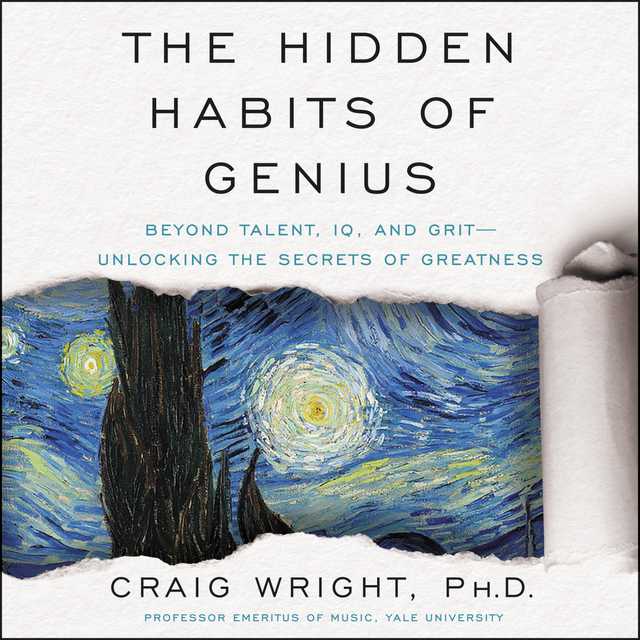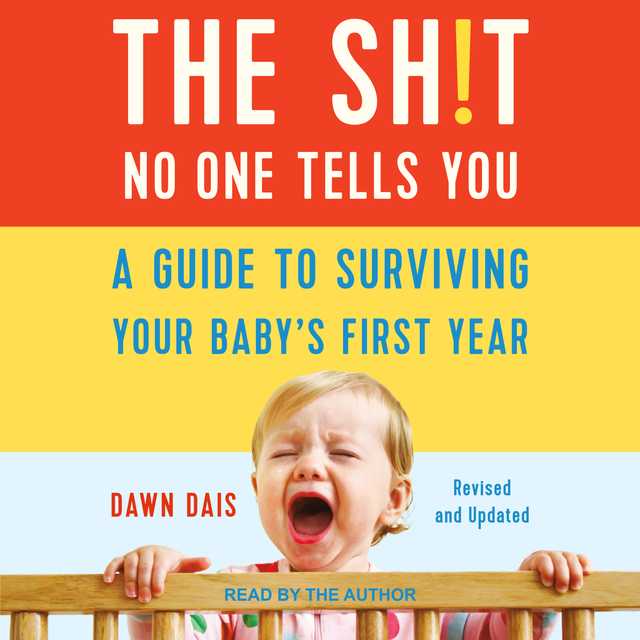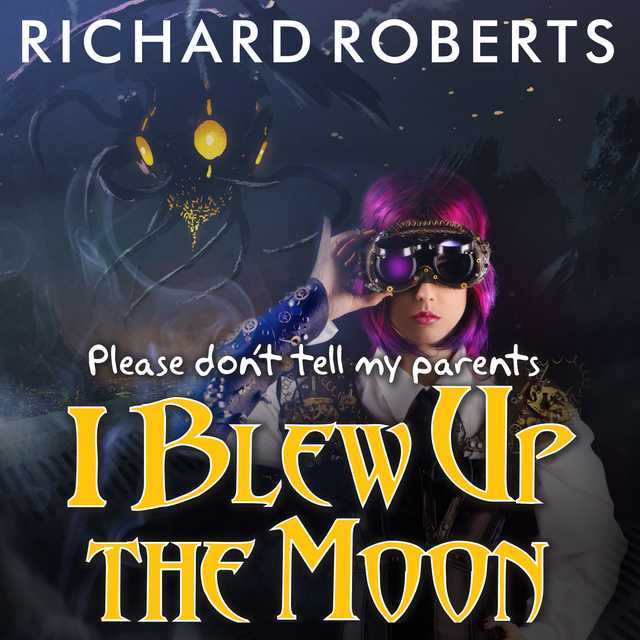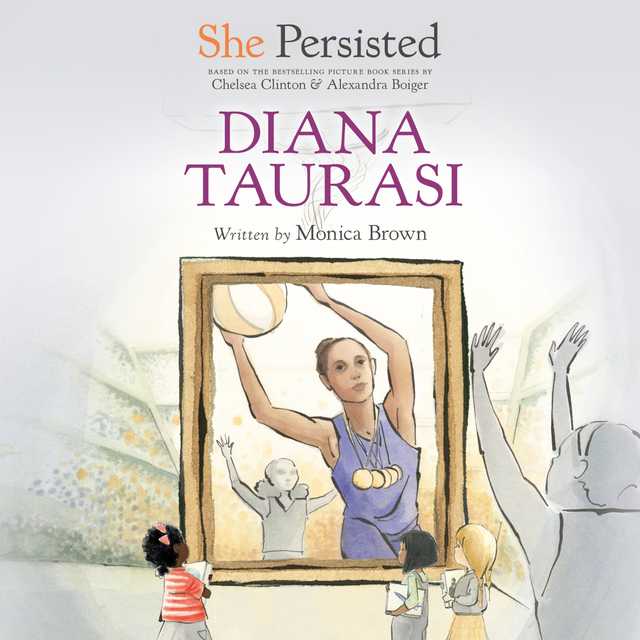The Hidden Habits of Genius Audiobook Summary
“An unusually engaging book on the forces that fuel originality across fields.” –Adam Grant
Looking at the 14 key traits of genius, from curiosity to creative maladjustment to obsession, Professor Craig Wright, creator of Yale University’s popular “Genius Course,” explores what we can learn from brilliant minds that have changed the world.
Einstein. Beethoven. Picasso. Jobs. The word genius evokes these iconic figures, whose cultural contributions have irreversibly shaped society.
Yet Beethoven could not multiply. Picasso couldn’t pass a 4th grade math test. And Jobs left high school with a 2.65 GPA. What does this say about our metrics for measuring success and achievement today? Why do we teach children to behave and play by the rules, when the transformative geniuses of Western culture have done just the opposite? And what is genius, really?
Professor Craig Wright, creator of Yale University’s popular “Genius Course,” has devoted more than two decades to exploring these questions and probing the nature of this term, which is deeply embedded in our culture. In The Hidden Habits of Genius, he reveals what we can learn from the lives of those we have dubbed “geniuses,” past and present.
Examining the lives of transformative individuals ranging from Charles Darwin and Marie Curie to Leonardo Da Vinci and Andy Warhol to Toni Morrison and Elon Musk, Wright identifies more than a dozen drivers of genius–characteristics and patterns of behavior common to great minds throughout history. He argues that genius is about more than intellect and work ethic–it is far more complex–and that the famed “eureka” moment is a Hollywood fiction. Brilliant insights that change the world are never sudden, but rather, they are the result of unique modes of thinking and lengthy gestation. Most importantly, the habits of mind that produce great thinking and discovery can be actively learned and cultivated, and Wright shows us how.
This book won’t make you a genius. But embracing the hidden habits of these transformative individuals will make you more strategic, creative, and successful, and, ultimately, happier.
Supplemental enhancement PDF accompanies the audiobook.
Other Top Audiobooks
The Hidden Habits of Genius Audiobook Narrator
Fred Sanders is the narrator of The Hidden Habits of Genius audiobook that was written by Craig Wright
Craig Wright is the Henry L. and Lucy G. Moses Professor Emeritus of Music at Yale University, where he teaches the popular undergraduate course, “Exploring the Nature of Genius.” A Guggenheim Fellow, Wright has received an honorary Doctorate of Human Letters from the University of Chicago, is a member of the American Academy of Arts and Sciences, and was awarded the Sewall Prize for Excellence in Undergraduate Teaching at Yale (2016) as well as the DeVane Medal for Excellence in Teaching and Scholarship (2018). He holds a Bachelor of Music degree from the Eastman School of Music and a Ph.D. from Harvard.
About the Author(s) of The Hidden Habits of Genius
Craig Wright is the author of The Hidden Habits of Genius
More From the Same
- Publisher : HarperAudio
- Abraham
- American Gods [TV Tie-In]
- Dead Ringer
- House of Sand and Fog
- Prey
The Hidden Habits of Genius Full Details
| Narrator | Fred Sanders |
| Length | 10 hours 7 minutes |
| Author | Craig Wright |
| Category | |
| Publisher | HarperAudio |
| Release date | October 06, 2020 |
| ISBN | 9780063005389 |
Subjects
The publisher of the The Hidden Habits of Genius is HarperAudio. includes the following subjects: The BISAC Subject Code is Creative Ability, Psychology
Additional info
The publisher of the The Hidden Habits of Genius is HarperAudio. The imprint is HarperAudio. It is supplied by HarperAudio. The ISBN-13 is 9780063005389.
Global Availability
This book is only available in the United States.
Goodreads Reviews
Janna
July 08, 2020
This sneak peek into a Yale class headed by the author deftly compares Stephen Hawking to Kanye West, Steve Jobs to Marie Curie, and Van Gogh to Oprah without seeming absurd. Whether you are a genius, a wannabe-genius, or simply a curious reader, you will find something to take away from Craig Wright's blending of historical fact and modern-day applications. Falling just short of a motivational-speech-slash-self-help-book, you will find enough "this is how to become a genius" tidbits if you look for them. However, the author does not shy from telling you directly that some people just don't have what it takes, and why.It's not 200+ pages of hero worship; far from it. He unapologetically calls out history's geniuses for their often glaring character flaws. He objectively states each genius's contributions to society without emotional reaction or personal opinion. He staunchly defends women geniuses throughout history and laments their historical treatment. Although in at least one example, he demonstrates that while he supports women taking prominent roles in the future, he does not empathize or put himself in a woman's shoes (figuratively speaking). I would love to have the chance to sit down with him and share some much-need perspective!All in all, I enjoyed The Hidden Habits of Genius, and would happily recommend it to college students, parents, and retirees alike. I was able to read an advance ebook copy, so keep an eye out for it on October 6, 2020!Rating: ★★★★☆ (4/5)
Rick
May 01, 2021
1. Why did I read this? I took this book for a weekend read and relax. I was curious to see, what a Yale Professor has to say about Genius.2. What happened during my reading? I learnt new things about famous people. I laughed many times with examples. I learnt new things about famous people. Maybe your sense of humor might be contrasting to me. 3. What's my own thoughts on this? My own thought on Genius means -- Original thinking. It seems definitions for Geniuses, change over generations. He brings many examples, I share few of them that I like.Professor Craig says about a famous statistician, Francis Galton. He says, Galton was wrong on his work of hereditary genius. Professor Craig says, “You can’t create a super horse or gifted race of men by selective breading.” He says, talent maybe heritable but genius cannot be created. Genius does not come from exceptional parents. 4. What's my qualms with this? My only qualm on the above is one historical example.The greatest American theologian -- Jonathan Edwards. Jonathan Edwards was a profound thinker, writer with depth thoughts.He had an extraordinary lineage - How? In his lineage, Edwards had produced accomplished generation. Many clergymen for generations. About thirteen presidents of higher learning, but now, changed into fourteen (2021) (Drew Faust)The contemporary last one in Edward's lineage - Drew Gilpin Faust. Faust was, president of Harvard. Sixty-five Professors, and many other persons of notable achievements -- How? Oh, maybe I can inject non-scientific explanation, “God blessed his generation.” How simple? I understand, Naturalists won’t agree with the above explanation. 5. What else does he say? Let's get to most famous example, Charles Darwin. Charles Darwin’s early academic was poor.His Father thought he was a disgrace to his family. Darwin flunked Medical school, transferred and gambled, drank, partied. Leaving all that behind, he embarked on his famous Beagle.I like the following from the book — “Darwin had been born with a love for Nature. He had also developed a desire to prove himself the equal of the scientific superiors. Many of them, he had failed to impress at Edinburgh and Cambridge. He also failed to please possibly of his father as well." 6. What other examples are inside? a) Steve Jobs -- People comment that he treated many like dirt. Would you want to be treated like dirty? Possibly not, no thanks! He had 2.65 GPA. It didn't matter when he made gazillions. b) Jack Ma, famous Chinese billionaire. He had got 19/120 on Math exam.What matters is not the school, but what is inside of you. c) John Stuart Mill, famous utilitarian says “Happiness is something that happens to us while we are pursuing some other purpose.” As people frequently talk about happiness in life, I remember this. Apparently, I sent this quote to a Cardiologist in Tirunelveli, Tamil Nadu (India) 7. What more does he say? The author says, Don’t over-regulate children. Let them break the rules. Let children explore, take risks, experience failure. Be a fox, roam around in curiosity, sometimes that doesn’t have self-restraint. A Polymath is one who can combine disparate things to create In my Goodreads profile, I've written - aspiring Polymath. It's a lofty ambition, slowly progressing.8. How much time does this take? If you are an avid reader - 3-4 hours. I would recommend this to everyone.Deus Vult, Gottfried
Jeremy
October 16, 2020
Any book that dissects the genius of Kanye West gets 5 stars from me
Matt
January 29, 2023
This is the type of book you want to devour slowly. I sure did take my time with this, I started reading it in November 2022 and finished it at the end of January 2023. I took notes thoroughly and slowly and reflected on each of the relevant takeaways. It really does talk about the individual habits of several of the best-known Geniuses out there. It gives you a definition of genius that is unlike anyone I have ever heard before. And it makes total sense after reading it.Also, while reading through this book I experimented with a new style of note-taking I'm going to have to go back through the front cover of the book where I took all my notes in my own words and transfer them to my second brain. I also plan on uploading maybe an updated review of this book after transferring my notes and getting a chance to reflect further on the takeaways of this book.So if I do end up doing this and posting something on Goodreads, do stay tuned for that. If not on Goodreads then I may create a video about it on YouTube or at least upload Snippets of it elsewhere on Instagram or Twitter.
Zane
January 04, 2021
I do have to say I would probably never picked up this one if it wasn't for a university assignment one of so many offered books that we need to analyse. I do not regret that this book appeared on my horizon, I will be grateful for the insights into genius habits and maybe a tiny bit more convinced that there is a small genius in me also, but he on the contrary to the mentioned ones is sleeping or napping. It was a tough cookie to analyze for a course, but nonetheless it was an interesting piece.
Paul
April 20, 2021
Interesting book that analyzes the lives of geniuses throughout history and across many different professions, nations, and walks of life. It often reads like a series of standalone articles, and felt repetitive to read for long periods of time. But the content was interesting and the takeaways were discrete and appropriate. Overlaps with a other books on habit formation, digital minimalism, meditation and goal-setting.
Beverlee
September 21, 2021
So interesting. Years ago I read Bereiter/Scardamalia's book on expertise. Turns out when you are good at something, and get praised, you do more of it and you become better at it. Experts can't help learning more and understanding more--whether you are an astrophysicist, baker, or auto mechanic. In fact, you can't help it. Being encouraged by knowledgable parents/mentors doesn't hurt at all. That many "geniuses" were poor students or dropped out of college or were monstrous is not a career or life path. It takes a lot of searching and trial and error to find your true passion.
Kailea
March 23, 2022
What a fun and informative little book.
Jenae
January 12, 2021
Such an interesting listen! Each chapter looked at a concept in relation to genius. My personal favorites were the chapter exploring the suppression of female geniuses and the chapter looking at formal education. Filled with fascinating biographical tidbits and strung together by a clear narrative, I definitely give this book a 5/5.
Travis
March 01, 2021
Life-changing analysis
Mal
January 26, 2022
Mozart. Joan of Arc. Einstein. Marie Curie. Steve Jobs. In The Hidden Habits of Genius, Craig Wright plumbs the depths of human capacity in nearly 100 extraordinarily successful individuals through the ages. In them, he finds the characteristics of genius that enable mere human beings to reach such heights of accomplishment that their efforts change society for millions of others and often resonate in memory for centuries to come. These fourteen traits he calls “hidden habits.”GENIUS DOESN’T MEAN WHAT YOU PROBABLY THINK IT MEANSFor Wright, “genius is creativity and creativity involves change.” A genius, in his view, is not simply a person of exceptional ability. “A genius,” he explains, “is a person of extraordinary mental powers whose original works or insights change society in some significant way for good or ill across cultures and across time.” But this is not what the author expected to find when he set out on his research. “I had in my mind a picture of the genius: someone with a superhigh IQ who, even as a youth, has sudden ‘aha’ insights, yet is eccentric and unpredictable. Every feature of this stereotypical imagine, I have now learned, is wrong or inaccurate in most cases.”100 GENIUSES PROFILEDWright delves into the lives of nearly 100 extraordinary individuals over the span of recorded history. Nearly all of them are boldface names we all readily recognize (or should). Scientists, musicians, painters, writers, politicians—they’re drawn from every walk of life. And, as Wright takes pains to point out, most of them have been extremely unpleasant people, who have treated their families and others around them very poorly. However, Wright does not include in his tally such legendarily bad actors as Ghengis Khan, Adolf Hitler, Joseph Stalin, and Mao Zedong, all of whom clearly fit his definition of genius for their impact on society. Wright errs on the side of constructive impact, not destructive.THE FOURTEEN CHARACTERISTICS OF GENIUSIn each of fourteen chapters, Wright elaborates on one of the “hidden habits” he perceives in genius. He sums them up in the introduction but doesn’t later name them as such. Here they are:Work ethicResilienceOriginalityChildlike imaginationInsatiable curiosityPassionCreative maladjustmentRebelliousnessCross-border thinkingContrarian actionPreparationObsessionRelaxationConcentrationPerhaps it’s obvious, but the point may need emphasis: every genius doesn’t necessarily exhibit all fourteen of these traits. In fact, I’d be surprised if any of them did. But every genius shows evidence of the majority of these “hidden habits.”IS IQ A MEASURE OF GENIUS?Can IQ tests measure genius? Wright powerfully makes the case that this may be the greatest fallacy of all about genius. In underlining the point, he cites “a famous ‘genius test’ conducted at Stanford by Lewis Terman and colleagues from the 1920s into the 1990s, a cohort of 1,500 youngsters with IQs over 135 [that] ultimately failed to produce a single genius.”Consider the question from a statistical perspective. About 1 in 31,560 individuals achieves an IQ score of more than 160, a level that’s frequently cited as indicating “genius.” There are some 7.8 billion people in the world. Which means that, if everyone could be tested, we would assume that roughly 247,000 people are geniuses. Does this make sense? Cut the number in half and half twice again, just to be safe, and you’re left with about 31,000. Are there 31,000 people in the world destined to “change [the world] for good or ill across cultures and across time?” I don’t think so. Do you? But might that IQ score simply be too low? Try 165 instead. Approximately 1 in 100,000 people are tested at that level or above. And if we perform the same calculations, we find that some 9,750 must be geniuses. Which is also absurd on the face of things.ON A PERSONAL NOTEPerhaps, then, we should look even higher on the IQ scale. The chances of scoring 200 on the Stanford-Binet intelligence test are 1 in 4,852,159,346. That’s 1 in 4.8 billion people, which means that such a person would presumably be alone in the world. But IQ, after all, is a measure of potential, not of achievement. And I happened to know a youngster in my home town who was reliably said to have an IQ at that level. He went to Harvard at age 11. And died of a heroin overdose the following year.Not convinced by any of this? I’ll add another personal note. When I was a child of three or four, my parents sent me to a licensed psychologist to determine my IQ. I was what was regarded as precocious. Distrusting the result, they got a second opinion. A year or two later, they had me tested again. As my mother told me many years later, I scored 165, 168, and 172 on these tests. (Yes, I still remember these numbers. I obsessed about them for far too long and wish she’d never told me.) Does this high IQ mean I’m a genius? Nonsense! Not even close.I’ve led a productive life for 80 years and become reasonably successful, but in no way, shape, or form have I changed the world, or even a very small part of it. I’m certain I’m of above average intelligence, but I frequently encounter people who run intellectual circles around me. And I often have trouble understanding densely written text. Genius as Craig Wright sees it, and as I see it, is exceedingly rare—and it’s clearly got little or nothing to do with IQ.For a reasonably well-balanced summary of what’s known about IQ, see “What is a genius IQ score?”A TEXT MARRED BY OCCASIONAL ERRORSWright has been teaching a course on genius at Yale for many years. The research he (or his graduate students) conducted to supply the details he cites in the book must have been extensive, indeed. However, it’s difficult for me to accept it all as gospel, because minor errors crop up in the text. For example, the sun is not the center of the galaxy (which is in fact some 26,000 light-years distant). And Mark Twain did not say or write “The coldest winter I ever spent was a summer in San Francisco” (no matter how many times others have attributed the saying to him).It’s not too much of a stretch to think that similar errors might have crept into Wright’s stories about the lives of the people he profiles. Still, nearly everything in the book of which I had prior knowledge squared with what I know, so I’m inclined to regard the errors as minor slip-ups and not consequential.ABOUT THE AUTHOR Craig M. Wright (1944-) was a professor of music at Yale University for decades and is now emeritus. He holds an MA and PhD in musicology from Harvard. The Hidden Habits of Genius is his seventh book. It followed his deep dive into the life of Wolfgang Mozart and Wright’s determination to understand the roots of the man’s genius.
Timothy
February 16, 2021
It’s hard to define genius. But I think we all want to feel special and this book does help us understand a bit more about how we can all better ourselves.
Marcy
August 09, 2020
I was able to read this book thanks to Netgalley.com The author explores the different historical figures that are or can be considered a genius. From Elizabeth the First to Stephen Hawking he delves into their life, and lifestyle, and why they are considered a genius. He also discusses the attributes that are shared among geniuses, including insatiable curiosity, hard work, and a bit of luck. I enjoyed the historical and biographical information. It is well written and entertaining. #netgalley
JunRong
November 28, 2021
Finished this after my ICT, having borrowed the book a second time from the library.Much to be gleaned from this book, very well researched! A talented person deals skillfully with the immediately evident world. A genius, however, sees what is hidden from the rest of us. - Arthur Schopenhauer The way the author defines Genius is this: A person of extraordinary mental powers whose original works or insights change society in some significant way for good or for ill across cultures and across time. Develop a list for learning - be open to new and unfamiliar experiences, be fearless, ask questions, listen carefully to the answer.Happiness resided in the looking, not in the accomplishment. - Silverstein’s The Missing PieceGeniuses don’t have a habit of being unbalanced, but they do have a proclivity to it. Mathematicians and scientists experience less psychic disorder than artists possibly because they deal with logical precepts and rational limits rather than boundless emotive expressions. Creatives are nonconformists. They are willing to defy convention and even authority to explore new ideas and to get to the truth. Creatives are persistent. They don’t give up when they get frustrated or rebuffed by a problem, they keep at it. Creatives are flexible. They are able to reformulate a problem when facing failure rather than just give up or continue down the same path. Above all else, creative types are risk takers. They are willing to take their chances on a unproven solution rather than go with the tried and true. - Barry Staw, Berkeley psychologist Had i really succeeded at anything else, I might never have found the determination to succeed in the one arena where i believed i truly belonged. I was set free, because my greatest fear had been realised, and I was still alive. The rock bottom became the solid foundation on which i rebuilt my life. The knowledge that you have emerged wiser and stronger from setbacks means that you are, even after, secure in your ability to survive. You will never truly know yourself, or the strength of your relationships, until both have been tested by adversity. - J K Rowling on failureWhy does change take so long? Because the rest of us don’t like disruptive ideas and the rebels who bring them. They make us uncomfortable. They force us to change. Change requires work. Combine disparate things to create transformative new ones. Half-formed ideas, they float around. They come from different places, and the mind has got this wonderful way of somehow just shovelling them around until one day they fit. The creative mind does not run along a straight track but rather jumps frenetically in a game of conceptual hopscotch. The more squares in play (more things you know from different fields) the the greater the distances, the greater the potential for a combinatorial insight that generates an exceptionally original idea. See the invisible link between things. Alexander Fleming, discoverer of penicillin, was well prepared for the luck break. He had been training for 30 years of professional activity, developing the observational skills and scientific knowledge to apprehend and exploit the import of what was before him. He had the genius to see what others would have ignored. Geniuses don’t stay home; they move to where circumstances are more favourable. Athens: Socrates, Plato, Aristotle (moved there at 17). Academics to universities (Stanford, Oxford). Tech to Silicon Valley. Artists, Writers, Poets to Paris. Agglomeration of opportunity is what compels geniuses to move. Financial support, access to new ideas, freedom of expression, competition? chance to test oneself against the very best. We should all realise that we have much studied material stored in long-term memory; we just need to relax and let it come to the fore. Focused concentration is the enemy of creativity. The ritual is not the stretching and weight training I put my body through each morning at the gym; the ritual is the cab. The moment i tell the driver where to go I have completed the ritual. With a ritual to fall back upon, you can get up and try again tomorrow. A solid routine saves you from giving up. We forget that the standard for genius is based on accomplishment, not character.
Jean
December 31, 2020
Learn about what enables geniusWright contends that various traits and behaviors are prominent in the lives of well-known individuals whom we know to be geniuses. This book explores the commonalities of great minds in ancient times, from Leonardo da Vinci, Nikola Tesla, Pablo Picasso to modern-day innovators like Steve Jobs.I appreciate how the author is cognizant that genius is still subjective, where he attempts to define the population he chose to examine. Before delving into the details, he sets out the motivations in question. He distinguishes geniuses from prodigies as he does not want to pronounce all talented individuals mistakenly. Genius, he emphasizes, involves some form of creativity and change, where talented individuals who merely achieve what already exists are not those in question.What I liked about the book:• He supplements his ideas with well-researched details on the lives of various individuals, which allows us to compare and contrast traits across different contexts (e.g. be it the arts of sciences, ancient or modern times, the author can draw on enough examples)• He identifies the various traits and habits and categorizes them neatly into each chapter, allowing for a clear presentation of his ideas.• He addresses some of the myths we often hold and challenges societal tendencies to rely on standardized means of identifying geniuses.• He tries to conclude each chapter with practical tips that can guide us to think about how to adopt different perspectives and approaches to help develop the mentioned traits.• Apart from what might come across as good reminders or confirmation to common assumptions, he delivers some insights to questions we have about great originals (e.g. is there a connection between genius and mania? Besides passion, what fuels their obsession for achievement?).I also felt that it was a little bit of each of these books - Range by David Epstein, Outliers by Malcolm Gladwell, and Originals by Adam Grant. Overall, I enjoyed reading the book as it was an easy read that goes beyond some of the intuitive opinions one might have about geniuses.
Juan
October 09, 2021
When we are children we have big dreams of what we can do with our lives. But there comes a time when we forget everything and only live "by instruments", without thinking, in a totally automatic way. No longer enjoying life or looking for new challenges. Inspiring for me the book "The Hidden Habits of Genius: Beyond Talent, IQ, and Grit - Unlocking the Secrets of Greatness" by Craig Wright. We are all called to be geniuses, simply achieving our potential in life, although many of us forget it. Geniuses are not that different from us, they may have special abilities, but this is not the most important thing, but things like: - Hunger to learn. - Find out what really motivates you and follow it. - Take advantage of your differences with others. - Be rebellious, non-conformist. - Find many solutions and approaches to problems, not always the same. - To think the opposite of what everyone thinks. - Be at the right time in the right place and be prepared (get lucky?) - Do things quickly (compared to the others) and yes, break things. - Relax for inspiration, focus for extraordinary results. And do you still have dreams or do you only live "by instruments"?
Nicky
November 02, 2020
Picked up this book because I watched Craig's online course on in classical music which was rather engaging. In this book, Craig dissected into what it means to be a genius and attempts to reason on some habits and why they allow the genius to perform.- What are geniuses? They are those who had an impact to a large audience over a long period of time. Furthermore, they must have added value and synthesized new stuff -- an innovation.- Genius are not about being a child prodigy or being able to perform in standardized test. Craig Wright mentions how he did not see a correlation in such adolescent achievements, and even those who did well in the test, are not exactly geniuses now.- Geniuses are often self-centered and terrible companions. This is because of their prioritization of their craft and they thinking. Most people do not like geniuses, or work for them, but after they have passed, everyone will be thankful for their contributions to the world and how it made life better for us.
Most Popular Audiobooks
Frequently asked questions
Listening to audiobooks not only easy, it is also very convenient. You can listen to audiobooks on almost every device. From your laptop to your smart phone or even a smart speaker like Apple HomePod or even Alexa. Here’s how you can get started listening to audiobooks.
- 1. Download your favorite audiobook app such as Speechify.
- 2. Sign up for an account.
- 3. Browse the library for the best audiobooks and select the first one for free
- 4. Download the audiobook file to your device
- 5. Open the Speechify audiobook app and select the audiobook you want to listen to.
- 6. Adjust the playback speed and other settings to your preference.
- 7. Press play and enjoy!
While you can listen to the bestsellers on almost any device, and preferences may vary, generally smart phones are offer the most convenience factor. You could be working out, grocery shopping, or even watching your dog in the dog park on a Saturday morning.
However, most audiobook apps work across multiple devices so you can pick up that riveting new Stephen King book you started at the dog park, back on your laptop when you get back home.
Speechify is one of the best apps for audiobooks. The pricing structure is the most competitive in the market and the app is easy to use. It features the best sellers and award winning authors. Listen to your favorite books or discover new ones and listen to real voice actors read to you. Getting started is easy, the first book is free.
Research showcasing the brain health benefits of reading on a regular basis is wide-ranging and undeniable. However, research comparing the benefits of reading vs listening is much more sparse. According to professor of psychology and author Dr. Kristen Willeumier, though, there is good reason to believe that the reading experience provided by audiobooks offers many of the same brain benefits as reading a physical book.
Audiobooks are recordings of books that are read aloud by a professional voice actor. The recordings are typically available for purchase and download in digital formats such as MP3, WMA, or AAC. They can also be streamed from online services like Speechify, Audible, AppleBooks, or Spotify.
You simply download the app onto your smart phone, create your account, and in Speechify, you can choose your first book, from our vast library of best-sellers and classics, to read for free.
Audiobooks, like real books can add up over time. Here’s where you can listen to audiobooks for free. Speechify let’s you read your first best seller for free. Apart from that, we have a vast selection of free audiobooks that you can enjoy. Get the same rich experience no matter if the book was free or not.
It depends. Yes, there are free audiobooks and paid audiobooks. Speechify offers a blend of both!
It varies. The easiest way depends on a few things. The app and service you use, which device, and platform. Speechify is the easiest way to listen to audiobooks. Downloading the app is quick. It is not a large app and does not eat up space on your iPhone or Android device.
Listening to audiobooks on your smart phone, with Speechify, is the easiest way to listen to audiobooks.






























